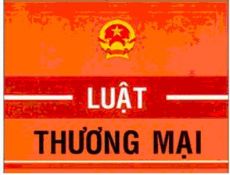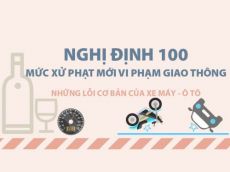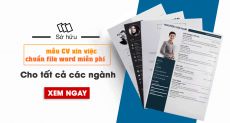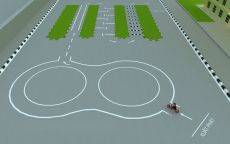570+ Câu trắc nghiệm Tiếng Anh ôn thi công chức, viên chức trình độ A1 có đáp án
Bộ 570+ câu trắc nghiệm Tiếng Anh trình độ A1 ôn thi công chức, viên chức có đáp án mới nhất được tracnghiem.net tổng hợp nhằm giúp các bạn có thêm tài liệu tham khảo, chuẩn bị thật tốt cho kì thi viên chức sắp đến. Để ôn tập hiệu quả các bạn có thể ôn theo từng phần trong bộ câu hỏi này bằng cách trả lời các câu hỏi và xem lại đáp án và lời giải chi tiết. Sau đó các bạn hãy chọn tạo ra đề ngẫu nhiên để kiểm tra lại kiến thức đã ôn.
Chọn hình thức trắc nghiệm (30 câu/30 phút)
Chọn phần
-
Câu 1:
Which of the following typifies the early impressionists?
A. They had a romantic emphasis.
B. They tried to represent the effects of light on people, areas of countryside.
C. They worked towards a unified goal.
D. They idealized life.
-
Câu 2:
Which of the following is the best title for the passage?
People commonly complain that they never have enough time to accomplish tasks. The hours and minutes seem to slip away before many planned chores get done. According to time management experts, the main reason for this is that most people fail to set priorities about what to do first. They get tied down by trivial, time consuming matters and never complete the important ones. One simple solution often used by those at the top is to keep lists of tasks to be accomplished daily. These lists order jobs from most essential to least essential and are checked regularly through the day to assess progress. Not only is this an effective way to manage time, but also it serves to give individuals a much deserved sense of satisfaction over their achievements. People who do not keep lists often face the end of the work day with uncertainty over the significance of their accomplishments, which over time can contribute to serious problems in mental and physical health.
A. Common Complaints about Work
B. Accomplishing Trivial Matters
C. Achieving Job Satisfaction
D. Learning to Manage Time
-
Câu 3:
According to the passage, why do many people never seem to have enough time to accomplish things?
A. They do not prioritize tasks
B. They get tied down by one difficult problem
C. They fail to deal with trivial matters.
D. They do not seek the advice of time management experts
-
Câu 4:
The word "those" in the passage refers to…………..
A. daily lists
B. trivial matters
C. priorities
D. people
-
Câu 5:
The word "achievements" could best be replaced by …………..
A. assessments
B. accomplishments
C. priorities
D. decisions
-
Câu 6:
The passage states that one solution to time management problems is to……
A. consult a time management expert
B. accomplish timeconsuming matters first
C. keep daily lists of priorities and check them regularly
D. spend only a short time on each task
-
Câu 7:
Which of the followings is the best title for the passage?
Hatred is a fundamental human emotion that has deep root in society and culture. Psychologists believe that group identity and cohesion depend to a large extent on having a common enemy. It seems that the existence of "bad guys" is an important element in defining who we are within a large realm. It could be said that human beings love to hate. The first signs appear early in life when a child, faced with blame for some mistake, immediately accuses another child or an inanimate object such as a teddy bear. Later, on the schoolyard playground, children in rival groups compete for attention and influence. These basic responses translate into more powerful emotions later in life. One area where deep-rooted hatred is exhibited is in the ethnic fights that constantly occur around the globe. These conflicts are not only over territory but also involve emotional issues of group identity and unity of purpose. For many, there is no "us" without a "them" to hate. In a word, where conflict between super powers is on the decline, it may be that humanity will have difficulty adapting to a state of mutual respect and cooperation.
A. Roots of society
B. Group unity
C. A basic emotion
D. Social and cultural problem
-
Câu 8:
According to the passage, what is believed to be an important aspect of defining group identity?
A. Facing a common enemy
B. Being reluctant to hate
C. Accepting blame for past actions
D. Ignoring a large realm
-
Câu 9:
According to the passage, early childhood responses to blame…........
A. are not related to stronger feelings in adulthood
B. are complex expressions of emotion
C. demonstrate how human beings love to hate
D. are not well understood by psychologists
-
Câu 10:
The author suggests that when children make mistakes, they…..
A. join rival gangs on schoolyard playgrounds
B. rarely accept responsibility for their actions
C. need emotional support from personal objects like teddy bears
D. readily admit to their errors
-
Câu 11:
According to the passage, ethnic conflicts….....
A. are on the decline
B. occur only occasionally
C. serve to resolve differences
D. have their roots in childhood rivalries
-
Câu 12:
What is the main idea of this passage?
With the onset of the winter season, man's natural enemies, the common cold and the flu, arrive with full force. It seems that the fluctuations in temperature and weather are guarantees that coughs and sneezes will spread inflecting germs among family and friends. More than 100 different types of bacteria can cause a cold, and doctors sometimes use antibiotics to treat bacterial colds. However, there are an equal number of viruses that can cause influenza, and modern science offers no drug capable of curing vital infections. In most cases, the best advice is the usual prescription: get plenty of rest, drink a lot of fluids, and be prepared to suffer for three to ten days. Some home cures help to relieve the symptoms of colds and flu. Mother's chicken soup, rich in fats and oils, helps to revitalize a tired body and to soothe a sorethroat. Garlic, containing the active ingredient allicin, has long been used to fight off the effects of bacteria and viruses. Hot toddies consisting of small amounts of liquor mixed with honey, sugar and lemon juice can relieve soreness and draw out cold germs. Finally, recent evidence suggests that large doses of vitamin C not only boost the immune system before a cold arrives, but also relieve cold symptoms after they have set in.
A. Man's natural enemies
B. The nature of colds and flu
C. Fluctuations in temperature
D. The onset of winter
-
Câu 13:
It can be inferred from the passage that germs are spread……....
A. through the air
B. only in winter weather
C. when the temperature is high
D. with great force
-
Câu 14:
It can be inferred from the passage that chicken soup is good for a sorethroat because…….
A. it can eliminate symptoms
B. mothers depend on it
C. it does not cause flu symptoms
D. the fats and oil have soothing qualities
-
Câu 15:
According to the passage, which of the following is NOT an ingredient of a hot toddy?
A. liquor
B. lemon juice
C. garlic
D. honey
-
Câu 16:
Books have great influence on ...........
It is often said that books are always a good friends and reading is an active mental process. Unlike TV, books make you use your brain. By reading, you think more and become smarter. Reading improves concentration and focus. Reading books takes brain power. It requires you to focus on what you are reading for long periods. Unlike magazines, Internet posts or e-Mails that might contain small pieces of information. Books tell the whole story. Since you must concentrate in order to read, you will get better at concentration. Many studies show if you do not use your memory; you lose it. Reading helps you stretch your memory muscles. Reading requires remembering details, facts and figures and in literature, plot lines, themes and characters. Reading is a good way to improve your vocabulary. Do you remember that when you were at elementary school you learned how to infer the meaning of one word by reading the context of the other words in the sentence? While reading books, especially challenging ones, you will find yourself exposed to many new words. Reading is a fundamental skill builder. Every good course has a matching book to go with it. Why? Because books help clarify difficult subjects. Books provide information that goes deeper than just classroom discussions. By reading more books you become better informed and more of an expert on the topics you read about. This expertise translates into higher self-esteem. Since you are so well-read, people look to you for answers. Your feelings about yourself can only get better. Books give you knowledge of other cultures and places. The more information you have got, the richer your knowledge is. Books can expand your horizons by letting you see what other cities and countries have to offer before you visit them.
A. TV
B. friendship
C. brain
D. muscles
-
Câu 17:
When you are reading a book,...........
A. you have to read small pieces of information
B. you use your brain in concentration and focus
C. you have to read during a very long time
D. you lose your memory
-
Câu 18:
A challenging book ..............
A. helps you to improve your vocabulary
B. is only for primary pupils
C. can translate all new words
D. only contains of simple ocabulary
-
Câu 19:
Books ..........
A. are compulsory in every good course
B. are not needed in most of course
C. contain less information than class discussions
D. make a sick patient feel better
-
Câu 20:
Books can help enrich .............
A. knowledge of other cultures
B. characters
C. self-esteem
D. muscles
-
Câu 21:
Reading
Reading, as you know, is a continuous and never ending process. If you do very little reading, or if you read only material that offers no challenge to your comprehension, your reading will be of very little use. Once we reach a certain age, or once our formal schooling is completed, many of us become so restricted in our choice of reading that we rarely read any new type of reading experience. We tend to read only books in our professional or business field, or only inspirational books, or only our favorite newspapers every morning, or only one magazine for which we have developed a preference. And the trouble starts here. You should neither read only for entertainment nor only for information but you should also read for intellectual growth, for mental stimulation, for enriching your background of knowledge, for wisdom, and for broader outlook and mature understanding. What kind of books should you read to continue your intellectual growth, to gain a background for opinion and for judgment? The answer is simple one: Read books in fields you have little or no acquaintance with, books that will open for you new horizons of learning, books that will help you explore new areas of knowledge and experience, books that will make the world and people more understandable to you. Sadly, more and more people today are giving up the printed word in favor of being entertained and informed by watching TV, a popular entertainment device present at almost homes. More and more children are being subjected to TV programming, perhaps as a babysitter. More than two hours of TV time per day are now a part of children development, generating physiological and mental problems that are of growing concern among experts.
A. completely stops when we finish our schooling
B. is an endless process
C. is of little use
D. should be done a little
-
Câu 22:
According to the text,
A. new type of reading experience often interests most of us.
B. we should only read for entertainment
C. reading for intellectual growth is necessary
D. we should not read for mental stimulation
-
Câu 23:
What kind of books is NOT recommended by the writer?
A. Books in fields you have little or no acquaintance with
B. Books that will help you explore new areas of knowledge and experience
C. Books that will open for you new horizons of learning
D. Books that are sold along the streets.
-
Câu 24:
We can learn from the text that today
A. people spend more time watching TV than reading books
B. more and more people enjoy reading
C. most babysitters prefer watching TV
D. most children spend less than 2 hours a day watching TV
-
Câu 25:
The writer
A. does not approve of reading process
B. prefers watching TV to reading
C. advises us to read as little as possible
D. appreciates reading
-
Câu 26:
The earthquake on May 12, 2008 in China,
On Monday, May 12, 2008 a violent earthquake, measuring 8.0 on the Richter scale, happened in southwestern China's Sichuan Province. Hundreds of aftershocks followed in the area. The earthquake destroyed thousands buildings, roads, schools and hospitals, as well as infrastructure like communication networks and electrical towers. Thousands of people died or are missing, and more than 45 million people were affected by the earthquake, which has been the worst natural disaster to hit China for 30 years. The American Red Cross has contributed $20 million to support the relief and recovery efforts of the Red Cross Society of China. These funds will be used to assist survivors through the purchase and distribution of relief supplies, coordination of logistics and transportation of disaster workers to the hardest hit areas. The American Red Cross has also sent relief experts to the affected area to help monitor and coordinate the response efforts. On June 6, the American Red Cross co-hosted a forum to address the U.S. response and recovery efforts following the earthquake. More than 30 representatives from humanitarian organizations, the business companies and the government participated in the event. More than 35,000 staff and volunteers with the Red Cross Society of China responded to the disaster by distributing food, water, tents and other essential items. The International Federation of Red Cross and Red Crescent Societies are providing 100,000 tents to help those in need. The Red Cross Society of China is a very strong organization with extensive experience responding to disasters. The American Red Cross has long history of working with the Red Cross Society of China, going to back to famines in 1906 and including severe storms earlier this year. There has been a close contact between the Red Cross Society of China and the International Federation of Red Cross and Red Crescent Societies, and they have been ready to provide additional support such as disaster workers, relief supplies or financial assistance. Concerned family and friends in the United States may have difficulty contacting their loved ones because telecommunication has been out of work by this disaster. If they are trying to reach relatives living in China or those who are citizens of China, the American Red Cross suggests them keep calling or try contacting other family members who live nearby.
A. left no aftershocks
B. destroyed everything except communication networks
C. caused no human loss
D. had effects on more than 45 million people
-
Câu 27:
According to the second paragraph,
A. the American Red Cross supported the relief and recovery efforts of the Red Cross Society of China
B. the American Red Cross owed the Red Cross Society of China $20 million
C. the victims of the earthquake were not helped to buy necessary things
D. disaster workers were not sent to the hardest hit areas because of the aftershocks
-
Câu 28:
Which sentence is NOT true?
A. There are more than 30 representatives from humanitarian organizations, the business companies and the government in the US helping the Chinese earthquake victims.
B. The American government did not do anything to help the earthquake victims in China.
C. The American Red Cross has contributed $20 million to help the earthquake victims in China.
D. The American Red Cross has also sent relief experts to help the earthquake victims in China.
-
Câu 29:
Which is not TRUE about the Red Cross Society of China?
A. It is a strong organization.
B. It gets on well with the American Red Cross.
C. It supplied the earthquake victims a lot of things except tents.
D. It has extensive experience responding to disasters.
-
Câu 30:
After the earthquakes
A. it has been difficult to contact with the resident in the attacked area
B. the American Red Cross advised people not to keep contact with the victims
C. contacting with the victims was not a problem
D. everything has been in order soon














